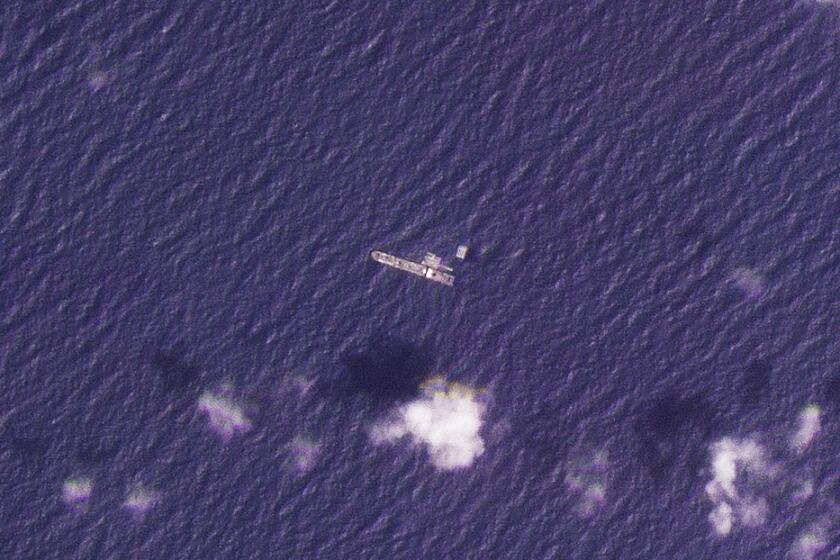Russia Will Air Its View of the World
Faced with international criticism over the Yukos Oil Co. crackdown, the war in Chechnya and a perceived rollback of democratic freedoms, the Russian government announced Tuesday that it would launch a 24-hour satellite television station in English to offer a glimpse of the world through Russian eyes.
Officials overseeing the $30-million-a-year project, dubbed Russia’s BBC by its backers, said the broadcasts would remain outside direct government control but would present a Russian perspective on issues such as the war in Iraq and the proposed European Union constitution, a view not usually heard in the international mass media.
Backers hope to have the service, Russia Today, operating by the end of 2005. Financing for the first year’s budget will come from a combination of government and private lending sources that have yet to be determined. In the future, they see a mix of government funding, grants and advertising revenue.
Analysts said that the service would almost certainly act as a Kremlin mouthpiece but that its financial viability would be determined by its willingness to present alternative viewpoints and a realistic view of political events unfolding in Russia.
“It is obvious that the Kremlin is not satisfied with the current information being reported about Russia and wants to create a new image for the country,” said Manana Aslamazyan, director of Internews Russia, a nonprofit organization that supports independent media.
“It is an effort to create an external image of the ‘managed democracy’ that we are building and to show it in an attractive way,” she said. “But I hope that the Kremlin will have enough political foresight to understand it is necessary to show a real picture of Russia, if they want people to watch it.”
The announcement followed a report last week that a unit of the state-controlled natural gas giant, Gazprom, was buying a majority share of the influential daily newspaper Izvestia.
The television project is reportedly the brainchild of Mikhail Y. Lesin, a wealthy media businessman and an advisor to President Vladimir V. Putin. It is being shepherded by RIA Novosti, the official Russian information agency.
“Many foreigners are surprised to see that Russia is different from what they see in media reports. We will try to present a more balanced picture,” said Margarita Simonyan, a former Kremlin reporter for state television who has been appointed editor in chief of the project.
“It’s going to be an information channel with competing points of view, so the audience can make up its mind about what is right and what is wrong,” she said.
RIA Novosti’s managing director, Svetlana V. Mironyuk, told reporters at a news conference held to announce the launch of the station that it would not be feasible in the competitive global TV industry to operate a news operation strictly as a propaganda tool.
“It is almost impossible to impose your own point of view among other opinions because the information space is too huge. There are literally scores of alternatives,” Mironyuk said. “But the idea is to provide an international audience with an understanding of what is going on in Russia, from Russia’s point of view.”
To compile a full report of news, weather, sports and documentaries, officials said, they will rely on translations of reports from Russian state TV, staffers at Novosti and the Itar-Tass news agency and freelance correspondents around the world.
Simonyan, 26, and other staff members were chosen because of their youth and lack of exposure to the propaganda-style news operations of the Soviet era, officials said.
“We’re starting from scratch, and we wanted to have a team of people who are younger than 30 years old. We want this to be a new kind of television,” Mironyuk said. “We know we’re taking a risk. But at the same time, we think the risk will be worth it.”
In recent months, government officials have frequently complained that foreign media have misrepresented Putin’s attempts to build democracy on Russia’s own timeline and with its constraints.
A particular sore point is the recent trial of Yukos Oil founder Mikhail Khodorkovsky, often depicted in the West as a martyred hero, while most Russians see his conviction on fraud and tax-evasion charges as a positive step for the country.
Putin also has been perplexed by the West’s focus on human rights abuses by his nation’s security services in the separatist republic of Chechnya, a conflict he sees as part of the international war on terrorism.
But Mikhail V. Seslavinsky, director of the federal Press and Mass Media Communications Agency, said a Russian global satellite network also might provide the world with an alternative view of the war in Iraq, the global economy and the EU constitution, which was rejected last week by voters in France and the Netherlands.
“Russia is close to Europe. It is among the [top] five countries, based on its gold reserves,” Seslavinsky said. “Russia has reoriented its currency basket in euros. Yet there was no voice from Russia in any of the news about the European constitution.”
More to Read
Start your day right
Sign up for Essential California for news, features and recommendations from the L.A. Times and beyond in your inbox six days a week.
You may occasionally receive promotional content from the Los Angeles Times.






